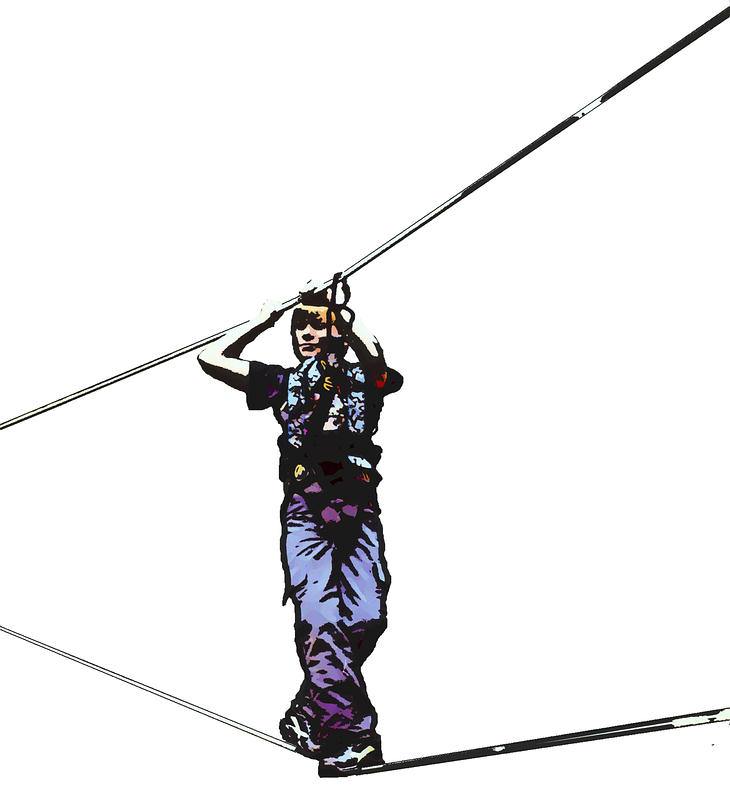source: www.youthwork-practice.com | 2000 Games, Devotions, Themes, Ideas and more for Youth Work
only for private using
Lawnmower parents
I'll say this in advance: if you read this text, you will say: no, I do not belong to such a group of parents. None the less, there are some examples you might recognize yourself. Understandably all parents only want the best for their children. But not everything that parents do is helpful in the long term.
Becoming a parent is not hard at all; being a parent, however, is. Undoubtedly this well-known piece of wisdom will be approved by all the legal guardians of this world. In the same way, many parents will have asked themselves at least once, whether they are doing everything right in the education of their children? After all, the style of bringing up children not only determines the current coexistence of child and parent but in no small measure on future behaviour. Lawnmower parents belong to a very particular type of parent.
What are lawnmower parents?
When the principal of a school receives an attorney's letter, threatening to take legal action because a pupil brought home bad grades, it is not unusual for so-called lawnmower parents to be behind it.
This is just one example of the excesses of an educational method that not really is one. Lawnmower parents are just helicopter parents, only worse. The characteristics of this strange kind of educational feeling can be found above all in the educated middle class. Parents that are usually well-off can refer to a regulated environment and orderly conditions as well as a good income. But especially in this social class, a rather unfounded paranoia is spreading.
In most cases, this is due to an increasing bombardment of bad news in the various media. Under these impressions of violent demonstrations, wars, and domestic disputes, the protective instinct of the parents is almost immeasurable increased. To spare their child real bad experiences, lawnmower parents are not about problem solvers; no, they ensure that problems do not even arise. They are mowing the possible difficulties the child might experience like the blade that grows to high on the lawn. They also do that very comprehensively.
Good grades at any price
It's not just about school, but it is here where their behaviour is most noticeable. This includes, for example, that the parents do the homework for their children, to make sure the children do not make any mistakes. Their only reason is that their child does not make any errors. Errors are not provided for in the value system of lawnmower parents. Failures are so negatively affected that it would almost equate to a catastrophe of epic proportions if the homework is graded as "good" instead of "very good." Since lawnmower parents do not trust their children because of the paranoia mentioned above, they prefer to do the homework themselves. However, this does not work for tests at school. If they do not pass, they are showing a side of themselves, which is by the lawnmower parents frowned upon. As a last resort, lawyers are instructed to sue the school. Sometimes there are even fights between the parents and the teacher in question.
Lawnmower parents are not above the situation; they are right in the middle of it
While helicopter parents carefully circle their children, just like helicopters in traffic surveillance, lawnmower parents are much closer to their children. This refers above all to the social environment and the child itself. Possible friends are checked and checked. The child's leisure activities are restricted in a way that the parent has full control. Alleged enemies are done with by all available means. However, the parents do mean well but do not see how destructive their behaviour is. They try to keep the child away from the evil of this world, and evil is known to lurk everywhere. Those parents are not aware that in the frame of social behaviour, they are bringing their child up to become an asocial adult.
In terms of classical parenting styles, lawnmower parents mix the authoritarian style with the egalitarian style. On the one hand, there is absolute obedience, because only then can the goals of the parents be enforced for the child. On the other hand, the child is given equal status on specific issues. However, only in decisions of little to no importance or in choices, which do not help the child to deal with conflict. This parenting style rather enhances the wrong sense of self, which is hardly a positive trait. For example, they might discuss at the breakfast table, which muesli might be the best or grant the child whichever toy it wants. Yet, on the other hand, regarding school, sports, or friends, those parents expect full compliance with their rules. Lawnmower parents are also characterized by the fact that they persuade their children into particular preferences because they meet their control mania.
Neither the authoritarian nor the egalitarian parenting style is recommended; the mixture of both is even worse!
What becomes of children from lawnmower parents?
Since the children of lawnmower parents are deprived of any real essential decisions, and this often well into their 20s, they later lack the decision-making ability, lack of independence, and self-assurance. Challenges cannot be overcome. In the case of mistakes, one's own guilt is transferred to others, and ultimately a sense of zero motivation and inability becomes widespread. That's certainly not in the interests of parents, who, like all parents, wanted only the best for their child.

Happy child
©: www.youthwork-practice.com
The best thing for a child, however, is that it is allowed to have freedom but also to abide by rules. If sanctions are necessary and the child is aware that it has made a mistake, then these sanctions or penalties should also be enforced. Each child explores its limits in every age segment.
Children do need boundaries. Not too tight, but at the same time, not boundlessness. Children also must learn to make decisions themselves. Above all, that requires trust and not control.
Children of lawnmower parents in the youth group
There are always parents who want to observe their child during the group lesson. They want to sit in, or who continuously inquire whether it has eaten enough, drunk enough, or if something had happened. Such worried parents will always exist. Calm the parents. The child usually feels well - even without constant observation of the parents. If parents learn to let go of their children, learn that their child can develop faster, better, and freer than under the constant "embrace and care" of their care, then these parents have learned something. And so, helped the child to become more independent.
It takes lawnmower parents a lot of effort to give their children some free, unsupervised time. If they could, they would organize the entire day of their child. They want to know at any time that everything is ok, and above all, want to talk to the child every day. I solved this problem that way that I told parents that they always could call me if they had any concerns. I assured them that their child is well, that everything is ok and that we have everything under control.
In this context, the "conjuring up" of homesickness plays a role. What I mean by that is that it is more the homesickness of the parents for the children. But that's another topic.
However, as mentioned above, over-anxious parents also do not stop at anything. If they feel that their child was somehow treated unfairly, mistreated, was unattended, ill during a camp, or injured, they will sue the youth leader. Which, of course, does not make our work any easier!

It takes lawnmower parents a lot of effort to give their children some free, unsupervised time.
©: www.youthwork-practice.com
[ © www.youthwork-practice.com | 2000 Games and Ideas for Youth Work ]






